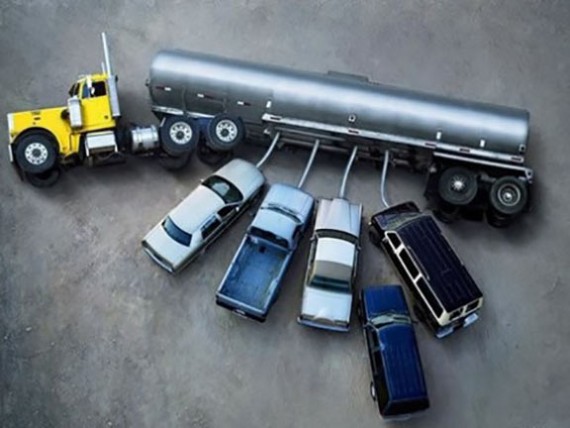Just a glimpse U.S. bankrupts...
Oct 29, 2015 00:21:05 #
When Trucks Stop, America Stops ATA
Trucks deliver ten billion tons of virtually every commodity consumedover 80 percent of all freight t***sported annually in the U.S. In the U.S. alone, this accounts for $700.4 billion worth of goods t***sported by truck.
What are the potential consequences of restricting or halting truck traffic in response to a national or regional emergency?
Consumer fear and panic will exacerbate/worsen shortages. forecast of a winter storm quickly exhausts basic commodities at grocery stores and supermarkets. It takes retailers up to three days to recover from these runs on supplies. News of a truck stoppagewhether on the local level, state or regional level, or nationwide will spur hoarding and drastic increases in consumer purchases of essential goods. Shortages will materialize quickly and could lead to civil unrest. Supplies of clean drinking water will run dry in two to four weeks. According to the American Water Works Association, Americans drink more than one billion glasses of tap water per day. For safety and security reasons, most water supply plants maintain a larger inventory of supplies than the typical business. However, the amount of chemical storage varies significantly and is site specific. According to the Chlorine Institute, most water treatment facilities receive chlorine in cylinders (150 pounds and one ton cylinders) that are delivered by motor carriers. On average, trucks deliver purification chemicals to water supply plants every seven to 14 days. Without these chemicals, water cannot be purified and made safe for drinking. Without truck deliveries of purification chemicals, water supply plants will run out of drinkable water in 14 to 28 days. Once the water supply is drained, water will be deemed safe for drinking only when boiled. Lack of clean drinking water will lead to increased gastrointestinal and other illnesses, further taxing an already weakened healthcare system.
Healthcare Both healthcare providers and consumers rely on regular delivery of medications and healthcare supplies to hospitals, pharmacies, nursing homes and other healthcare facilities. Trucks deliver nearly all of these supplies. Al Cook, former president of the Materials Management Association and current member of the Medical Materials Coordinating Group, which is advising the U.S. Department of Health and Human Resources on emergency preparedness, describes over-the-road commercial t***sportation as life and death to being able to care for sick people. This means that essential basic supplies, such as syringes and catheters, are not ordered until the supplies are depleted. These systems depend on trucks to deliver needed supplies within hours of order placement. Internal redistribution of supplies in hospitals could forestall a crisis for a short time; however, in a matter of hours, hospitals would be unable to supply critical patient care.
Hospitals and nursing homes will exhaust food supplies in as little as 24 hours. Hospitals and nursing homes receive daily truck deliveries of food for patients.
Trucks t***sport just about all cargo to and from air and rail terminals and maritime ports. Trucks also deliver fuel to the majority of rail yards. The Air T***sport Association estimates that trucks account for approximately 80 percent of the fuel deliveries to the nations airports. Truck t***sport is the mechanism for fuel delivery to service stations and truck stops. Service station fuel supplies will start to run out in just one to two days.
Researchers predict that automobile travel will cease within one week if fuel deliveries are halted.
A fuel shortage will create secondary effects. Without access to automobile travel, people will be unable to get to work causing labor shortages and increased economic damage.
Without fuel, police, fire, rescue and other public service vehicles will be paralyzed, further jeopardizing public safety.
Waste Removal The Environmental Protection Agency estimates that Americans generate more than 236 million tons of municipal or household waste annually. This does not take into account manufacturing, medical, or other types of commercial waste. Within days of a truck stoppage, Americans will be literally buried in garbage with serious health and environmental consequences. Further, without fuel deliveries, many waste processing facilities will be unable to operate equipment such as backhoes and incinerators. Uncollected and deteriorating waste products create rich breeding grounds for microorganisms, insects, and other vermin. Hazardous materials and medical waste will introduce toxins as well as infectious diseases into living environments.
Trucks deliver ten billion tons of virtually every commodity consumedover 80 percent of all freight t***sported annually in the U.S. In the U.S. alone, this accounts for $700.4 billion worth of goods t***sported by truck.
What are the potential consequences of restricting or halting truck traffic in response to a national or regional emergency?
Consumer fear and panic will exacerbate/worsen shortages. forecast of a winter storm quickly exhausts basic commodities at grocery stores and supermarkets. It takes retailers up to three days to recover from these runs on supplies. News of a truck stoppagewhether on the local level, state or regional level, or nationwide will spur hoarding and drastic increases in consumer purchases of essential goods. Shortages will materialize quickly and could lead to civil unrest. Supplies of clean drinking water will run dry in two to four weeks. According to the American Water Works Association, Americans drink more than one billion glasses of tap water per day. For safety and security reasons, most water supply plants maintain a larger inventory of supplies than the typical business. However, the amount of chemical storage varies significantly and is site specific. According to the Chlorine Institute, most water treatment facilities receive chlorine in cylinders (150 pounds and one ton cylinders) that are delivered by motor carriers. On average, trucks deliver purification chemicals to water supply plants every seven to 14 days. Without these chemicals, water cannot be purified and made safe for drinking. Without truck deliveries of purification chemicals, water supply plants will run out of drinkable water in 14 to 28 days. Once the water supply is drained, water will be deemed safe for drinking only when boiled. Lack of clean drinking water will lead to increased gastrointestinal and other illnesses, further taxing an already weakened healthcare system.
Healthcare Both healthcare providers and consumers rely on regular delivery of medications and healthcare supplies to hospitals, pharmacies, nursing homes and other healthcare facilities. Trucks deliver nearly all of these supplies. Al Cook, former president of the Materials Management Association and current member of the Medical Materials Coordinating Group, which is advising the U.S. Department of Health and Human Resources on emergency preparedness, describes over-the-road commercial t***sportation as life and death to being able to care for sick people. This means that essential basic supplies, such as syringes and catheters, are not ordered until the supplies are depleted. These systems depend on trucks to deliver needed supplies within hours of order placement. Internal redistribution of supplies in hospitals could forestall a crisis for a short time; however, in a matter of hours, hospitals would be unable to supply critical patient care.
Hospitals and nursing homes will exhaust food supplies in as little as 24 hours. Hospitals and nursing homes receive daily truck deliveries of food for patients.
Trucks t***sport just about all cargo to and from air and rail terminals and maritime ports. Trucks also deliver fuel to the majority of rail yards. The Air T***sport Association estimates that trucks account for approximately 80 percent of the fuel deliveries to the nations airports. Truck t***sport is the mechanism for fuel delivery to service stations and truck stops. Service station fuel supplies will start to run out in just one to two days.
Researchers predict that automobile travel will cease within one week if fuel deliveries are halted.
A fuel shortage will create secondary effects. Without access to automobile travel, people will be unable to get to work causing labor shortages and increased economic damage.
Without fuel, police, fire, rescue and other public service vehicles will be paralyzed, further jeopardizing public safety.
Waste Removal The Environmental Protection Agency estimates that Americans generate more than 236 million tons of municipal or household waste annually. This does not take into account manufacturing, medical, or other types of commercial waste. Within days of a truck stoppage, Americans will be literally buried in garbage with serious health and environmental consequences. Further, without fuel deliveries, many waste processing facilities will be unable to operate equipment such as backhoes and incinerators. Uncollected and deteriorating waste products create rich breeding grounds for microorganisms, insects, and other vermin. Hazardous materials and medical waste will introduce toxins as well as infectious diseases into living environments.
can I say more

now you know what makes the big trucks

Smile and keep on truckin

If you want to reply, then register here. Registration is free and your account is created instantly, so you can post right away.
